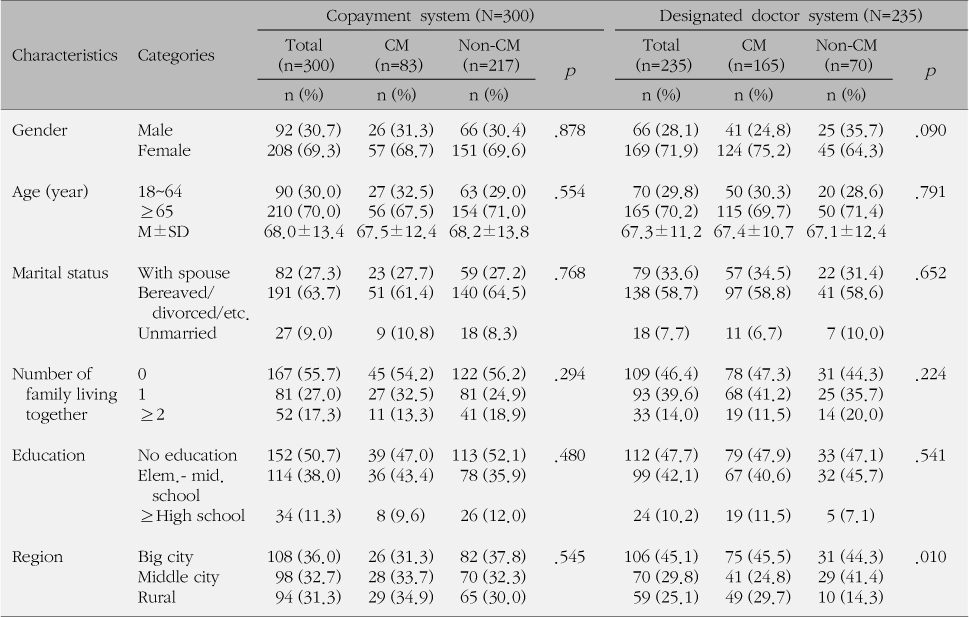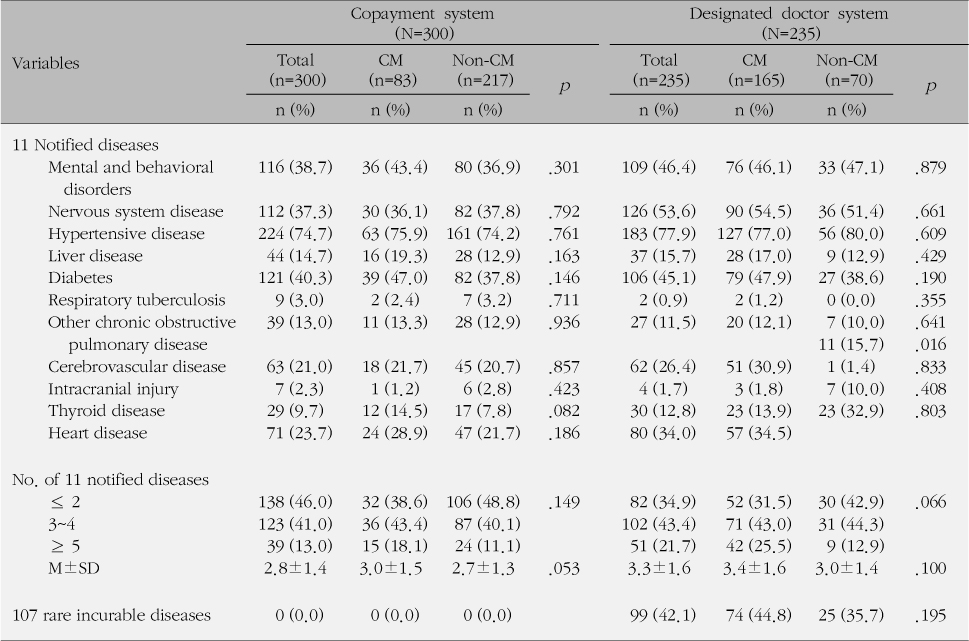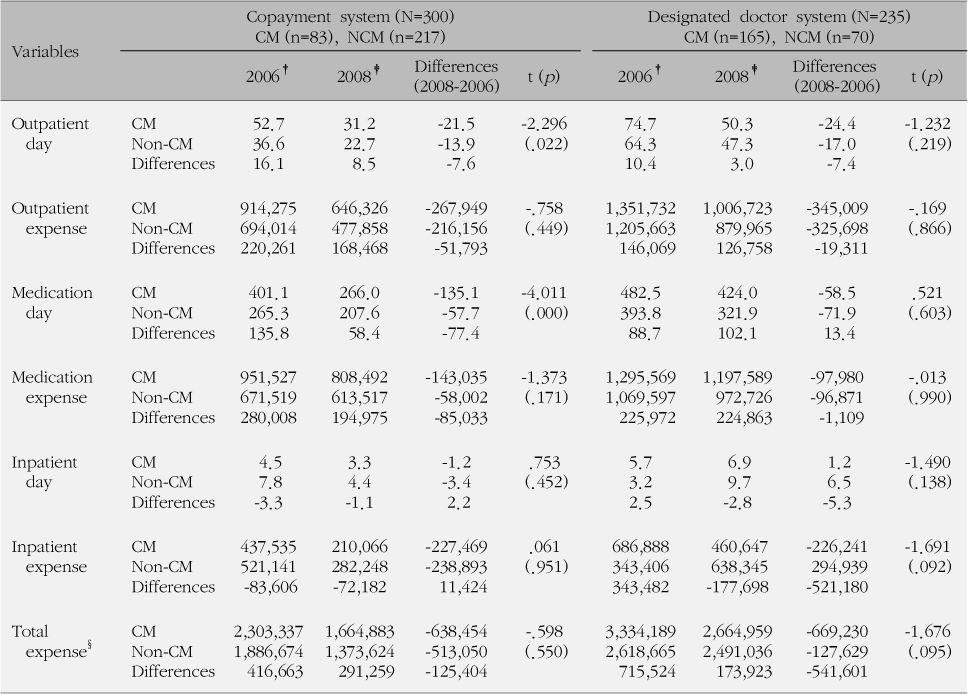Articles
- Page Path
- HOME > J Korean Acad Community Health Nurs > Volume 21(4); 2010 > Article
-
Original Article
- The Effects of Case Management for Medicaid on Healthcare Utilization by the Medicaid System
- Seung Joo Lim
-
Journal of Korean Academy of Community Health Nursing 2014;21(4):375-385.
DOI: https://doi.org/10.12799/jkachn.2010.21.4.375
Published online: April 4, 2014
Part-time Lecturer, College of Nursing, Seoul National University, Korea.
• Received: September 29, 2010 • Revised: November 16, 2010 • Accepted: November 23, 2010
© 2010 Korean Academy of Community Health Nursing
This is an Open Access article distributed under the terms of the Creative Commons Attribution Non-Commercial License (http://creativecommons.org/licenses/by-nc/3.0/) which permits unrestricted non-commercial use, distribution, and reproduction in any medium, provided the original work is properly cited.
- 557 Views
- 0 Download
- 5 Crossref
Abstract
-
Purpose
- This study examined the effects of case management (CM) for Medicaid on healthcare utilization considering the Medicaid system.
-
Methods
- Data were extracted from survey data on "Healthcare utilization and health status of Medicaid beneficiaries" conducted in 2007 and 2008 by the Ministry for Health, Welfare and Family Affairs. This study was designed to compare the effects on healthcare utilization between the CM group and the non-CM group. The subjects were 535 Type I Medicaid beneficiaries who utilized healthcare more than 365 days during 2006.
-
Results
- The outpatient days and medication days of the CM group decreased significantly more than those of the non-CM group with the copayment system. There were no significant differences of healthcare utilization between the CM group and the non-CM group with the designated doctor system.
-
Conclusion
- CM worked effectively on Medicaid beneficiaries' outpatient healthcare utilization with the copayment system. However, its effects on hospitalization, which is a major cause increasing the total expense, were not observed. Therefore, future studies are needed to develop strategies to reduce hospitalization and Medicaid beneficiaries' outpatient healthcare utilization with the designated doctor system.
Table 1General Characteristics of Beneficiaries with Copayment System or Designated Doctor System (Unit: person)


Table 2Disease Characteristics of Beneficiaries with Copayment System or Designated Doctor System (Unit: person)


-
This article is based on a part of the first author's doctoral thesis from Seoul National University.
NOTES
- 1. Hong SW. The effects of copayments on healthcare utilization in the type I medicaid beneficiaries. Seoul: Seoul National University; 2009. Unpublished doctor's thesis.
- 2. Jeon BY. Outcome and long-term and mid-term directions for development of the medicaid system. In : Moon OK. In: Discussion on the outcome and development challenges of the medicaid system In: Symposium Conducted at the Meeting of Celebrating the 30th Anniversary of Korean Medicaid; Seoul, Korea. 2007;11.
- 3. Kim SM. Utilization changes of hypertension patients according to the medical aid program types. Incheon: Gachon University of Medicine and Science; 2009. Unpublished master's thesis.
- 4. Kim SR, Choi JS, Ju JS, Choi MY, Yang JH, Chae JM. The effect of office visit copayments on utilization among medicaid beneficiary in South Korea (K46-2008-82). Seoul: Health Insurance Review & Assessment Service; 2008.
- 5. Kim YO. Impacts of implementing outpatient cost-sharing system to medicaid type 1 recipient on the health utilization and expenditure. Seoul: Yonsei University; 2008. Unpublished master's thesis.
- 6. Lee IS, Lee YR, Kang HG. Evaluation of case management for medicaid. Seoul: Ministry of Health & Welfare, & Yonsei University; 2004.
- 7. Ministry of Health & Welfare. Guideline of outpatient copayment system and designated doctor system to Medicaid type I 2007a;Retrieved July 31, 2010. from http://www.mohw.go.kr/front/jc/sjc0601vw.jsp?PAR_MENU_ID=06&MENU_ID=06060901&page=2&BOARD_ID=1003&BOARD_FLAG=&CONT_SEQ=41300&SEARCHKEY=&SEARCHVALUE=&SCH_SILKUK_ID=&SCH_DEPT_ID=&CREATE_DATE1=&CREATE_DATE2=
- 8. Ministry of Health & Welfare. 2007 Guideline of medicaid management. Seoul: Ministry of Health & Welfare; 2007b.
- 9. Ministry for Health, Welfare, & Family Affairs. 2008 Guideline of medicaid management. Seoul: Ministry for Health, Welfare, & Family Affairs; 2008.
- 10. National Assembly Budget Office. 2005 analysis of closing accounts of an annual revenue and expenditure 2006;Retrieved November 8, 2009. from http://www.nabo.go.kr/korea/view/11search/search.jsp
- 11. Oh JJ, Choi JM, Ji YG. Health services use and health status of medicaid beneficiaries according to medicaid policy change. Seoul: Ministry of Health, Welfare and Family Affairs, Korea Human Resource Development Institute for Health and Welfare, & Dankook University; 2009.
- 12. Rhee WH. Developing a case management strategies program for a Korean medical aid clients. Seoul: Hanyang University; 2006. Unpublished doctor's thesis.
- 13. Shin HW, Shin YS, Yun PK, Lee IJ, Lim SJ. Efficient managerial plan of medicaid expenditure. (2009-84). Seoul: Korea Institute for Health and Social Affairs; 2009.
- 14. Shin YA, Shin HC, Shin HW, Park EJ, Hong SW, Shin SM, et al. Health services use and health status of medicaid beneficiaries according to medicaid policy change. Seoul: Ministry of Health, Welfare and Family Affairs, Korea Human Resource Development Institute for Health and Welfare, & Institute of Case Management for Medicaid; 2008.
- 15. Shin YS, Shin HW, Hwang DK, Rho IC. Monitoring for medicaid financial efficiency (2006-20-1). Seoul: Korea Institute for Health and Social Affairs; 2006.
- 16. Shin YS, Shin HW, Hwang DK. Effectiveness of case management for medicaid I (2007-17-2). Seoul: Korea Institute for Health and Social Affairs; 2007.
- 17. Taylor CB, Miller NH, Reilly KR, Greenwald G, Cunning D, Deeter A, et al. Evaluation of a nurse-care management system to improve outcomes in patients with complicated diabetes. Diabetes Care. 2003;26(4):1058–1063. ArticlePDF
- 18. Weinberger M, Oddone EZ, Henderson WG. Does increased access to primary care reduce hospital readmissions? Veterans Affairs Cooperative Study Group on Primary Care and Hospital Readmission. N Engl J Med. 1996;334(22):1441–1447. ArticlePubMed
- 19. Yu WS. Outcome and long-term and mid-term directions for development of the Medicaid system. In : Moon OK. In: Presentation on the outcome and development challenges of the medicaid system In: Symposium Conducted at the Meeting of Celebrating the 30th Anniversary of Korean Medicaid; Seoul, Korea. 2007;11.
Figure & Data
References
Citations
Citations to this article as recorded by 

- The Effect of Case Management Services for High-risk Medicaid Beneficiaries
Young Jin Ahn, Yun-Kyoung Choi
Journal of the Korea Academia-Industrial cooperation Society.2015; 16(8): 5430. CrossRef - The Effects of the Designated Doctor System on Health Care Utilization of Medical Aid Beneficiaries with Chronic Diseases
Min Jung Kim, Young-Ha Cho, Nam Hee Park
Journal of Korean Academy of Community Health Nursing.2015; 26(3): 278. CrossRef - A Study on Influential Factors on Satisfaction with the Use of Medical Services by the Qualified Recipients of Medical Aid(focusing on the period after the introduction of the selected medical center system)
Jin-Woo Lee, Se-I Yang, Kwang-Hwan Kim
Journal of Digital Convergence.2014; 12(3): 289. CrossRef - Effectiveness of Community-based Case Management for Patients with Hypertension
Soon-Nyoung Yun, In-Sook Lee, Jin Hyun Kim, Young Ko
Journal of Korean Academy of Community Health Nursing.2014; 25(3): 159. CrossRef - The Effects of the Designated Doctor System on the Health of Medical Aid Beneficiaries
Jeongmyung Choi, Jinjoo Oh
Journal of Korean Academy of Community Health Nursing.2012; 23(4): 438. CrossRef

 KACHN
KACHN

 PubReader
PubReader Cite
Cite

